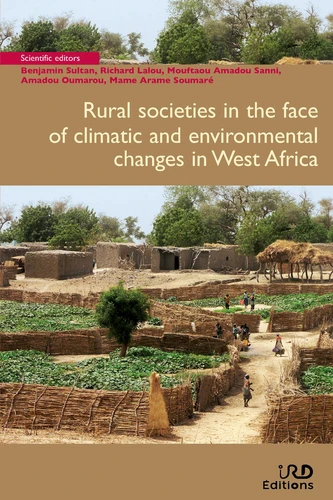Rural societies in the face of climatic and environmental changes in West Africa
Par : , , , ,Formats :
Disponible dans votre compte client Decitre ou Furet du Nord dès validation de votre commande. Le format Multi-format est :
- Pour les liseuses autres que Vivlio, vous devez utiliser le logiciel Adobe Digital Edition. Non compatible avec la lecture sur les liseuses Kindle, Remarkable et Sony
 , qui est-ce ?
, qui est-ce ?Notre partenaire de plateforme de lecture numérique où vous retrouverez l'ensemble de vos ebooks gratuitement
Pour en savoir plus sur nos ebooks, consultez notre aide en ligne ici
- Nombre de pages432
- FormatMulti-format
- ISBN978-2-7099-2425-2
- EAN9782709924252
- Date de parution09/06/2020
- Protection num.NC
- Infos supplémentairesMulti-format incluant PDF avec W...
- ÉditeurIRD Editions
Résumé
The future of West Africa depends on the capacity of its agriculture to ensure the food security of the population, which should double in the next 20 years, while facing up to the new risks resulting from climate warming. Indeed, the changes in temperature and precipitations already operating and that should become more marked will have serious effects on agricultural production and water resources in this part of Africa in the near future.
One of the keys to meeting this new challenge is the adaptation of rural societies to climate risks. To gain better knowledge of the potential, processes and barriers, this book analyses recent and ongoing trends in the climate and the environment and examines how rural societies perceive and integrate them: what are the impacts of these changes, what vulnerabilities are there but also what new opportunities do they bring? How do the populations adapt and what innovations do they implement-while the climate-induced effects interact with the social, political, economic and technical changes that are in motion in Africa? By associating French and African scientists (climatologists, agronomists, hydrologists, ecologists, demographers, geographers, anthropologists, sociologists and others) in a multidisciplinary approach, the book makes a valuable contribution to better anticipation of climatic risks and the evaluation of African societies to stand up to them.
One of the keys to meeting this new challenge is the adaptation of rural societies to climate risks. To gain better knowledge of the potential, processes and barriers, this book analyses recent and ongoing trends in the climate and the environment and examines how rural societies perceive and integrate them: what are the impacts of these changes, what vulnerabilities are there but also what new opportunities do they bring? How do the populations adapt and what innovations do they implement-while the climate-induced effects interact with the social, political, economic and technical changes that are in motion in Africa? By associating French and African scientists (climatologists, agronomists, hydrologists, ecologists, demographers, geographers, anthropologists, sociologists and others) in a multidisciplinary approach, the book makes a valuable contribution to better anticipation of climatic risks and the evaluation of African societies to stand up to them.
The future of West Africa depends on the capacity of its agriculture to ensure the food security of the population, which should double in the next 20 years, while facing up to the new risks resulting from climate warming. Indeed, the changes in temperature and precipitations already operating and that should become more marked will have serious effects on agricultural production and water resources in this part of Africa in the near future.
One of the keys to meeting this new challenge is the adaptation of rural societies to climate risks. To gain better knowledge of the potential, processes and barriers, this book analyses recent and ongoing trends in the climate and the environment and examines how rural societies perceive and integrate them: what are the impacts of these changes, what vulnerabilities are there but also what new opportunities do they bring? How do the populations adapt and what innovations do they implement-while the climate-induced effects interact with the social, political, economic and technical changes that are in motion in Africa? By associating French and African scientists (climatologists, agronomists, hydrologists, ecologists, demographers, geographers, anthropologists, sociologists and others) in a multidisciplinary approach, the book makes a valuable contribution to better anticipation of climatic risks and the evaluation of African societies to stand up to them.
One of the keys to meeting this new challenge is the adaptation of rural societies to climate risks. To gain better knowledge of the potential, processes and barriers, this book analyses recent and ongoing trends in the climate and the environment and examines how rural societies perceive and integrate them: what are the impacts of these changes, what vulnerabilities are there but also what new opportunities do they bring? How do the populations adapt and what innovations do they implement-while the climate-induced effects interact with the social, political, economic and technical changes that are in motion in Africa? By associating French and African scientists (climatologists, agronomists, hydrologists, ecologists, demographers, geographers, anthropologists, sociologists and others) in a multidisciplinary approach, the book makes a valuable contribution to better anticipation of climatic risks and the evaluation of African societies to stand up to them.








